‘Eternity’ wrestles with the perils of hard choices
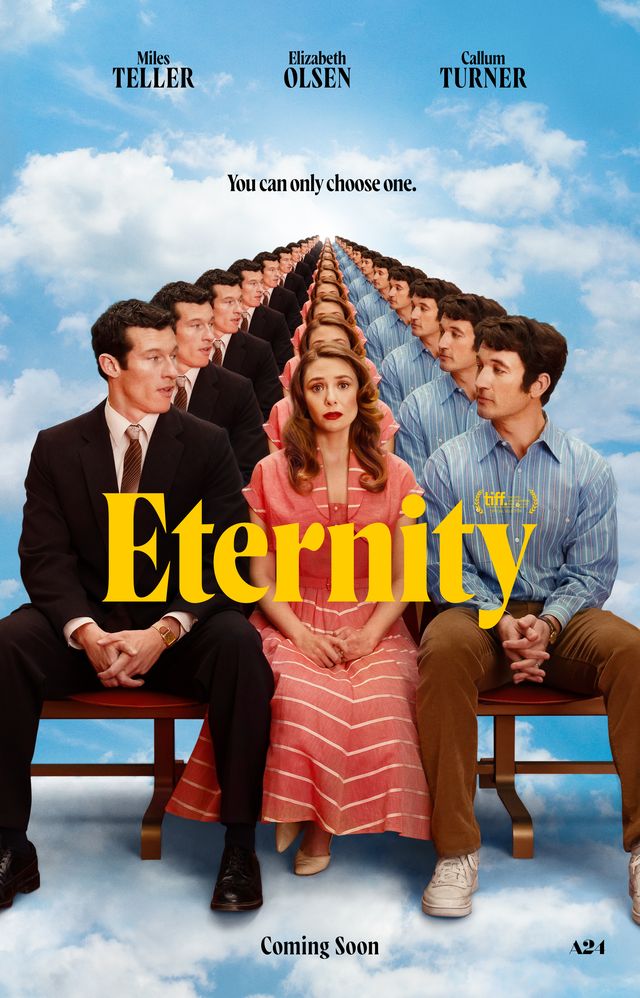
“Eternity” (2025). Cast: Miles Teller, Elizabeth Olsen, Callum Turner, Da’Vine Joy Randolph, John Early, Olga Merediz, Barry Primus, Betty Buckley, Tailya Evans, Panta Mosleh, Ryan Biel, David Z. Cohen. Director: David Freyne. Screenplay: Patrick Cunnane and David Freyne. Web site. Trailer.
Upon her death, Joan finds herself in a place called “Junction 301,” a location that looks like a cross between a train station and convention center hotel, a kind of afterlife way station for the recently deceased. But a way station to where? That’s what Joan – who has now assumed the physical appearance of herself from a time in her life that pleased her most (Elizabeth Olsen) – is about to find out, assisted by Ryan, her designated AC (Afterlife Coordinator) (John Early).
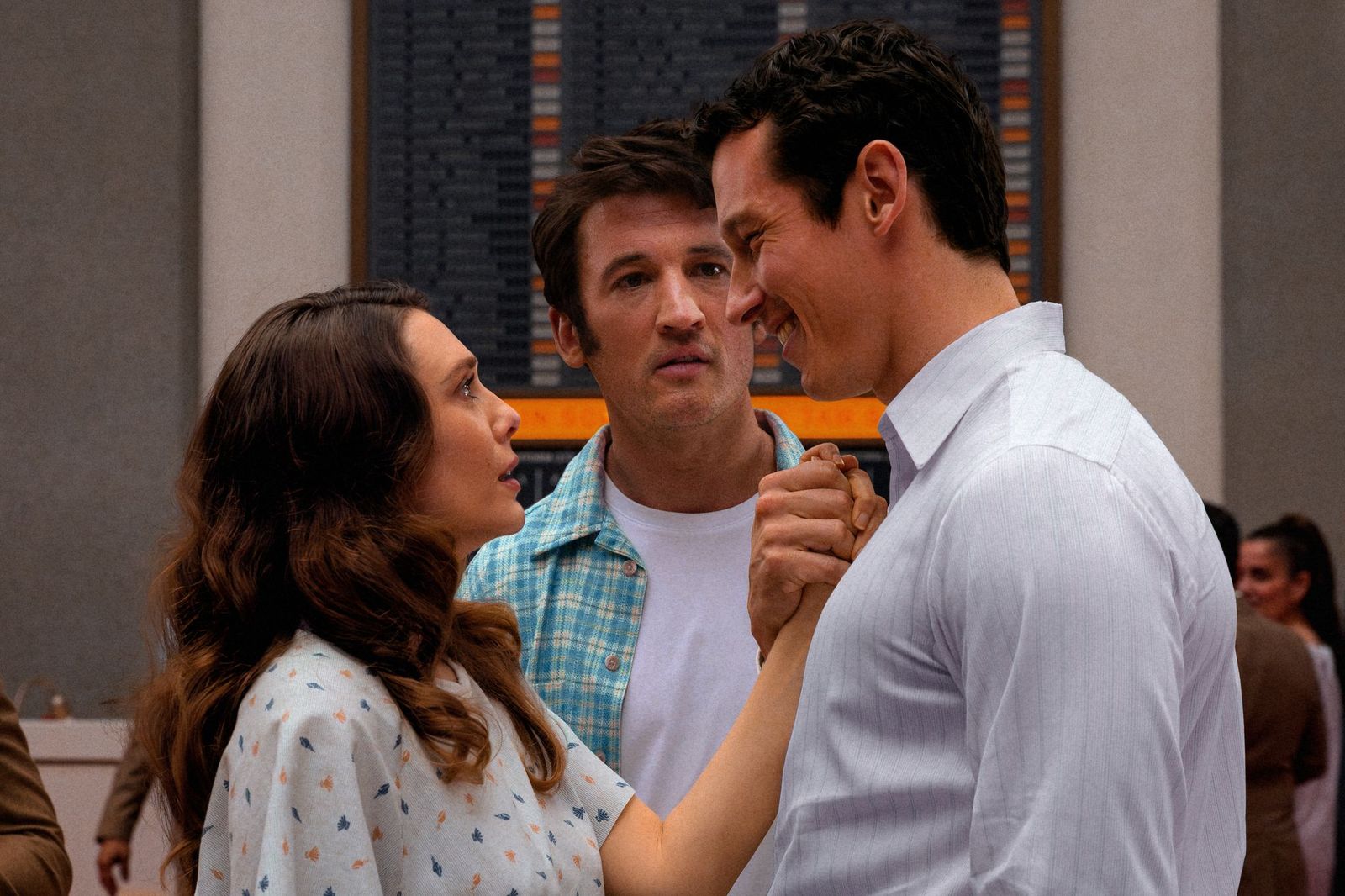
Ryan explains that the corporeal human conception of the afterlife is seriously mistaken. Most believe that eternity is essentially the same for everyone, a blissful, brilliantly illuminated world of wispy clouds, smiling cherubs and ethereal harp music. However, that’s just one form that it can take. In actuality, the afterlife is capable of assuming myriad forms, and it’s up to us to choose the one that appeals to us most. For instance, eternity can be based on specific locales, such as beach world, or periods in history, such as 1930s Germany (but without Nazis), or specific personal interests, such as museum world. And those are just a few of the options. In fact, Junction 301’s exhibition hall features an array of booths where representatives talk up the pleasures and benefits of their respective eternities, a kind of divine trade show where new arrivals can sample what could await them.
Having such a smorgasbord of choices available to us might seem quite enticing, if a bit overwhelming. But, despite the wide range of options, there are a few ground rules that everyone must bear in mind. First, newly arrived spirits have a week to choose the form of eternity they wish to experience, and, if they don’t make a selection in that time, they can stay in the Junction but must take a job to help guide new arrivals or to tend to the facility’s upkeep. And, second, once they make their choice, there’s no changing it, their decisions enforced by security officers who dole out unpleasant sanctions for those who attempt to violate these terms.
In light of the foregoing, Ryan urges Joan to make her decision wisely, given that eternity is a long time, one that can be difficult to endure with regrets. And, considering how many choices are available, making a decision can indeed be potentially problematic. However, Joan soon finds that making an informed choice could be even more difficult than she imagined.
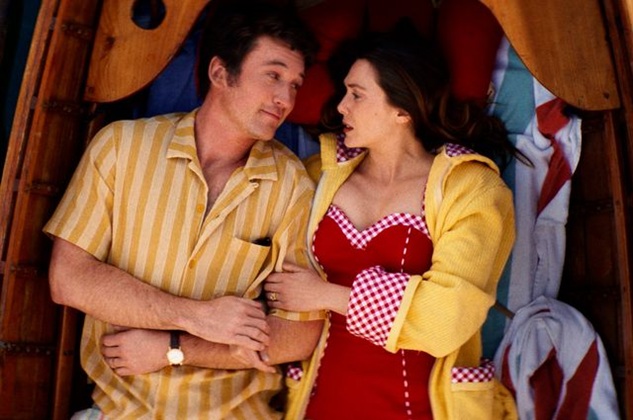
The reason? Two others have been awaiting Joan’s arrival, and each of them wants to spend eternity with her. One is her recently deceased husband, Larry, who, like Joan, has assumed a more youthful appearance (Miles Teller). The other is Joan’s first husband, Luke (Callum Turner), a soldier who was killed in battle at a young age and has spent the past 67 years working as a bartender at the Junction awaiting his beloved’s arrival.
Needless to say, Joan is overwhelmed, given that she loves both men. She had a long full life with Larry, and walking away from him would be devastating. At the same time, though, Luke was Joan’s first love, and she was crushed by his death, given that they had only spent a short time together. And, as much as she loved Larry for so many years, she always quietly regretted not having had more time with Luke, feeling as though fate had somehow cheated them out of having such an experience.
But who is Joan supposed to choose now? In picking one over the other, somebody is bound to have his heart broken, and that’s not even taking into account the heartbreak she’ll encounter herself. What’s more, given that Larry and Luke both want to spend eternity with Joan, they now find themselves in competition with one another, a battle of wits that quickly and frequently turns nasty as they each plead their case to the woman they love, a scenario that upsets Joan even more.
So how is this seemingly impossible situation to be resolved? That’s the challenge posed to the members of this awkward romantic triangle. Joan consults Ryan for help, but he reminds her that the decision must ultimately be hers. Larry follows suit, seeking the counsel of his AC, Anna (Da’Vine Joy Randolph), but, despite a few suggestions, she basically tells him the same thing that Ryan told Joan. And Luke, who’s on his own, tries to figure out what he can do to impress his long lost love and convince her into choosing him. With circumstances like this, one can’t help but wonder whether resting in peace is even possible.
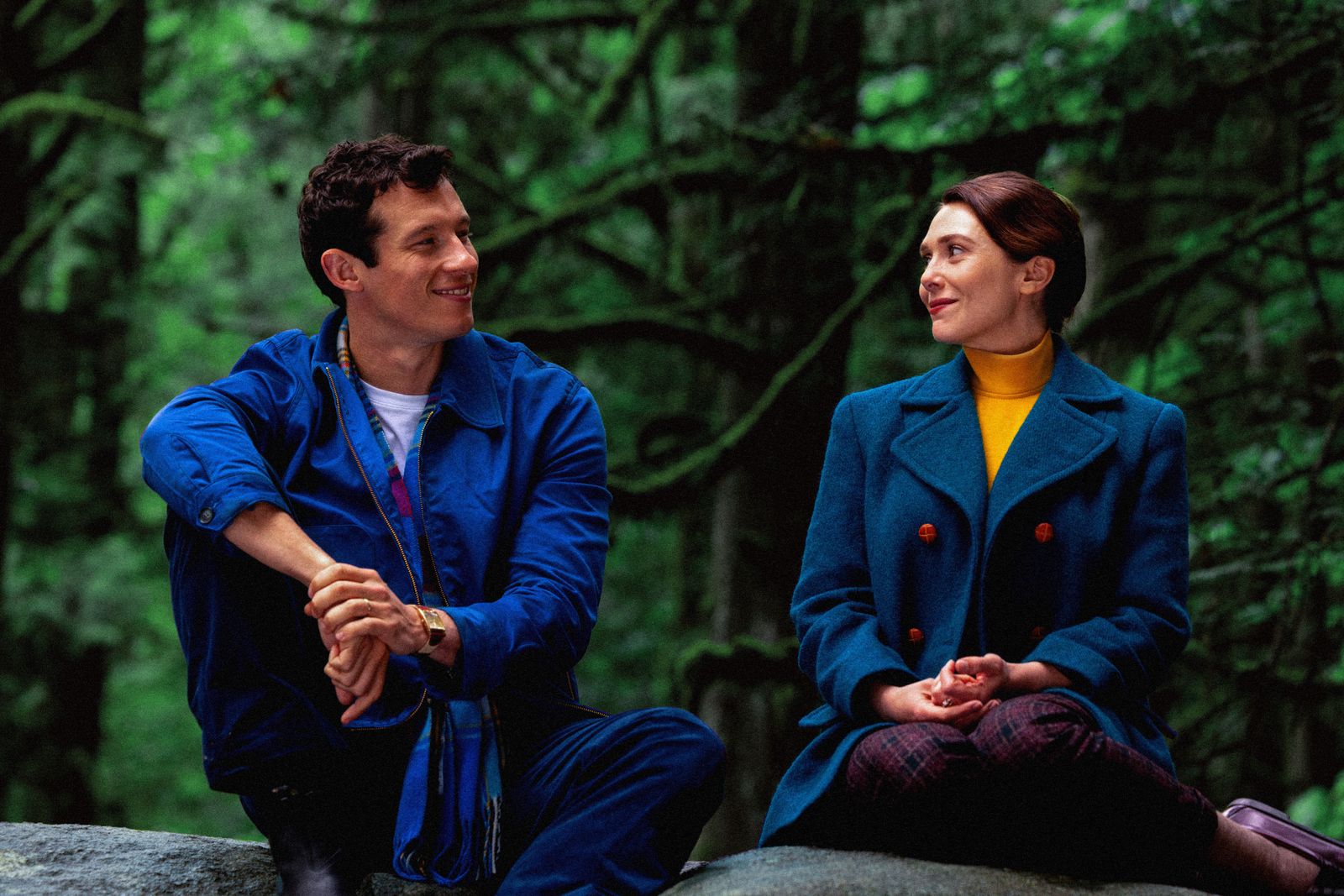
Obviously, some hard choices are called for here. But how does one choose when the options appear impossible to reconcile? That’s rock and a hard place material, to be sure. But, if a choice has to be made, one must find a way to work through the situation to determine the most feasible solution, and that begins with an examination of our beliefs. And that’s crucial considering the role they play in the manifestation of our existence, a product of the conscious creation process, the philosophy that makes this result possible. It’s unclear whether Joan, Larry and Luke have ever heard of this school of thought, but, considering the conundrum they’re up against, their beliefs may well be all they have to work with in determining a solution. And given how long that solution is going to be in place, they had better consider their respective beliefs – and how they will be employed – wisely.
Consider how the recently deceased in this story have the ability to choose an afterlife tailor made to their specifications. That’s not a product of random chance. It stems from our beliefs, intents that originate from within each of us, and how to employ them in manifesting something tangible. In taking on this task, they provide insight into what we’re thinking, what we would like to materialize in our reality and even how we might go about doing so. In essence, they’re the perfect metaphysical tools for tackling a venture such as this. The question in this, though, is, are we capable of making use of them to our best advantage? What’s more, can they be drawn upon for smoothing out bumps in the road that pop up along the way?
Those questions are undoubtedly important to Joan, Larry and Luke. It’s a safe bet that all three of them want the best for themselves, particularly given the promise of what the afterlife holds in store for them. But, considering the dilemma they face, can they see a way clear to fulfill that potential? Specifically, can they resolve the unforeseen challenge that has arisen on the path to eternal bliss? In light of these issues, perhaps their beliefs may supply the key in helping them work things out.
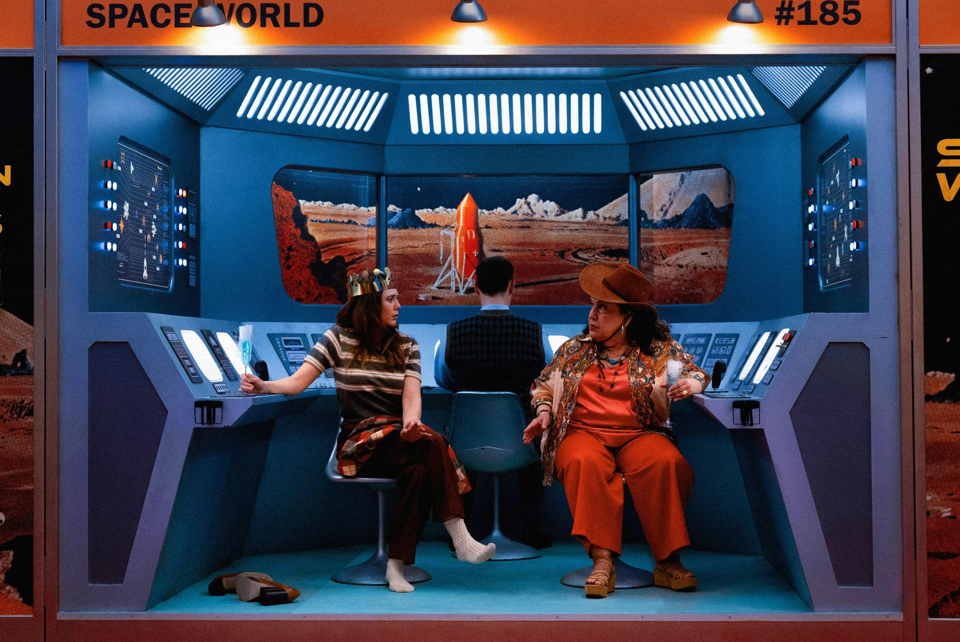
Achieving this calls for an awareness of, and an ability to tap into, the infinite range of belief possibilities open to each of us, including this story’s three principals. In particular, this requires looking past belief limitations, exposing us to possibilities we might not have previously considered. The ability to envision the unexplored may thus open the door to the solutions we need to overcome challenges and lead us to the satisfaction and fulfillment we seek.
For example, Joan is torn about whether to spend eternity with either Larry or Luke, a source of great anguish for her. But this quandary is driven by a fundamental belief that she has only two choices open to her. Perhaps she needs to consider whether there are other options. Just as the Junction 301 exhibition hall showcases the wide range of eternities open to everyone, maybe Joan should consider tapping into that same kind of breadth when it comes to assessing the belief possibilities available to her, particularly in considering a path forward for herself. In that regard, an unconsidered third belief option just might provide the solution she needs.
Meanwhile, as Joan seeks to sort out her options, so, too, do Larry and Luke. Yet, given the competition going on between them, they might not be able to see past their conflict to devise a strategy for winning over her heart. In fact, they’re so locked into the belief creating this clash between them that they may be losing sight of what they’re fighting for and how to attain it. Perhaps they need to broaden their belief horizons to redirect their focus on how to achieve their goal and not on how to defeat the opposition.
However, as apparent as these options may seem to those accustomed to this way of thinking, they might readily elude those who are unaware of or unpracticed at it. So, when such circumstances arise, perhaps seeking the advice of others may prove truly helpful, and, fortunately, the trio of protagonists recognize this. When Joan becomes frustrated about her situation, she consults Ryan, as well as her longtime friend, Karen (Olga Merediz), another new arrival in the afterlife. Karen possesses a street smart wisdom when it comes to tapping into her beliefs, unafraid to explore options that others might not understand or appreciate and that definitely take her out of her comfort zone, decisions that pay big dividends. She thus sets an example for Joan, one that might provide her with the inspiration she needs to make fresh choices and a new start.
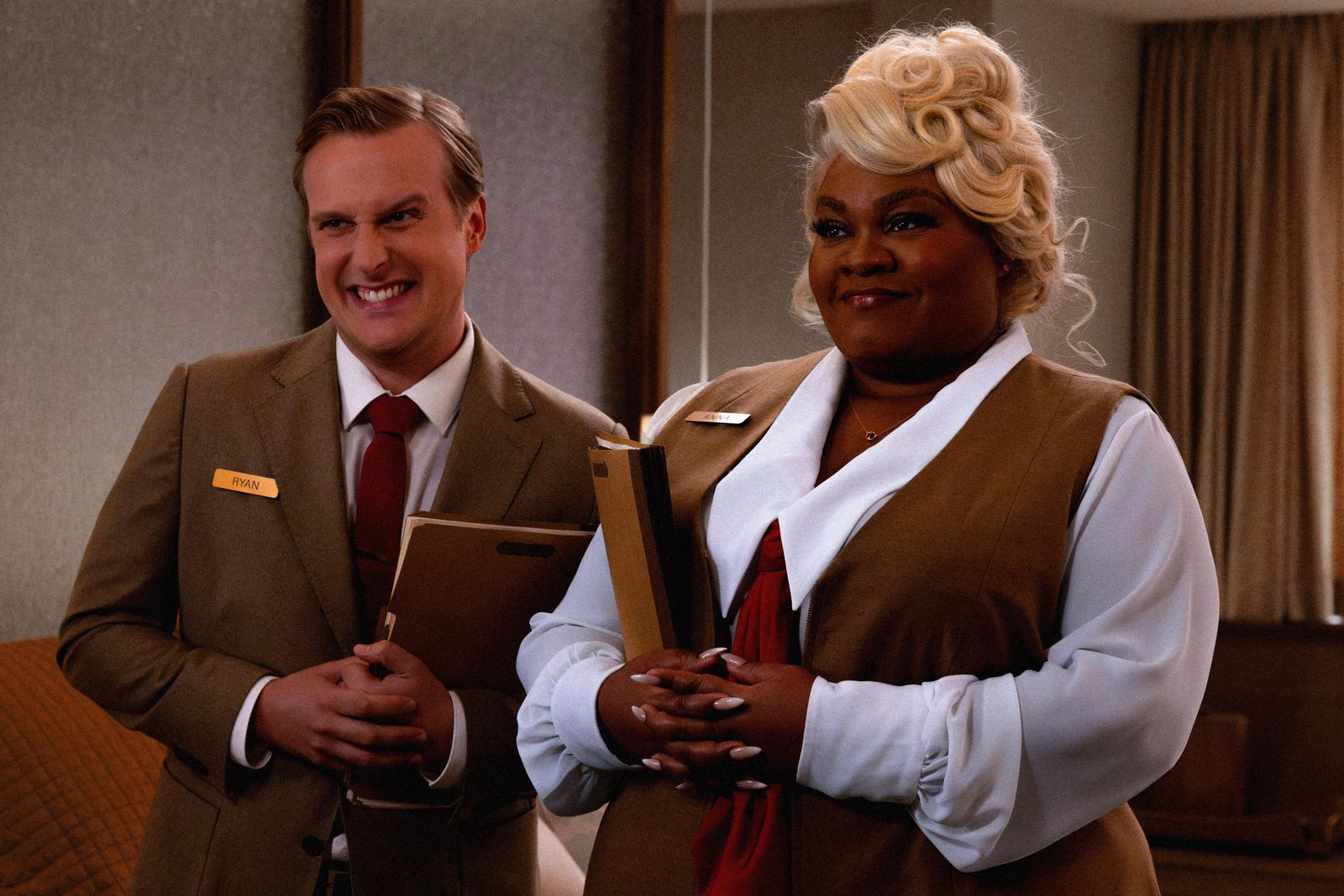
Larry does the same when he feels like he’s reached a dead end. He often seeks advice from Anna, who, as his AC, can’t get overly involved in his decision-making process. However, like Karen, she, too, has a certain moxie that her client can draw upon for assistance. For instance, when Larry wonders how he can get Joan’s attention in the wake of the distraction that is Luke, Anna gently suggests that he make an effort to remind Joan of why they fell in love in the first place, especially since they became involved in the time not long after Luke’s untimely passing. As simple as that suggestion may sound, perhaps it will touch something powerful in Joan’s heart, reawakening a deeply held belief that turns her attention toward him. If nothing else, such a gesture could be just what it takes to turn his attention away from his feud with Luke and toward his efforts to vie for her affections.
No matter how we employ our beliefs in the creation of our existence, we should remain ever cognizant of the power they carry and the possibilities they afford. That’s especially true when it comes to making use of them in life’s – or the afterlife’s – big decisions. Whether or not the depiction of the afterlife comes anywhere close to what it looks like in this film remains to be seen. But, given everything our beliefs can potentially make possible, we shouldn’t rule it out. If the hereafter is truly meant to be a time of tremendous joy, we should do everything we can to see it realized that way, particularly if we’re the ones calling the shots to make that happen. We just might find the key to living happily ever after, not to mention being eternally grateful.
As this heart-tugging tale shows, hard choices can indeed be fraught with challenges and perils. But that’s not to say we can’t transform those circumstances into something beautiful and everlasting. However, reaching that point may call upon us to look within, to examine our beliefs and to grow in ways we may never have imagined. “Eternity,” which opens in theaters on Thanksgiving Day, provides viewers with a delightfully whimsical journey through these experiences, showing us how to face – and survive – the tests of character that may accompany them, ultimately enabling us to thrive. In that sense, director David Freyne’s latest calls to mind themes examined in such previous related offerings as “Defending Your Life” (1991) and “What Dreams May Come” (1998). And, in doing so, this crowd-pleasing romantic charmer holds viewer interest well with its numerous plot twists, inventive and surprisingly edgy humor, steady narrative pacing, and fine performances from the entire ensemble, especially Randolph and Early in memorable supporting roles. It’s also gratifying to watch a romcom that doesn’t resort to clichés or get trapped in the kinds of sappy, manipulative tropes so often typical of releases in this genre. It’s genuinely refreshing to see a depiction of eternity that certainly doesn’t feel like it. Here’s hoping the real thing comes across the same way.
Copyright © 2025, by Brent Marchant. All rights reserved.



